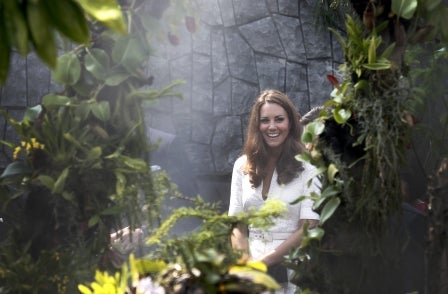
So what to make of the following list:
"kate middleton topless pics"; "kate middleton topless"; "topless kate middleton"; "kates photography"; "kate middleton topless pictures"; "topless kate middleton photos"; "topless kate middleton pictures"; "kate middleton topless photos"; "french newspaper kate middleton" . . .
And on and on it went. In all, the list ran to over 1,000 phrases that related to photographs of a semi-naked princess and their publication in the French edition of Closer magazine last Friday.
These, then, are just a selection of the search terms that brought people from Google, Bing, Yahoo! and the rest to Press Gazette at the end of last week.
This much we know: first, the traffic that came our way represented a small fraction of the total generated by interest in the story. Those same search terms – and many others beside – took readers to websites, blogs and forums around the world, those with print heritage and those without.
The graph below, taken from Google Trends, starkly illustrates the point.
Second, some (perhaps most) of those whose search brought them to this site were, ultimately, disappointed.That’s not a judgement on Press Gazette (neither pre- nor post-redesign). Rather it’s a recognition that lots and lots of people wanted to see the pictures for themselves.
Did they really come to Press Gazette to research the story? Maybe. To find out what the regulator’s reaction would be if a British publication followed suit? Some, for sure. Did others come to get the context without the visuals? Certainly, yet there were plenty of the "where can I see topless pictures of kate middleton"-style searches in that 1,000 plus-strong list that leave no room for interpretation. They came in vain. (In an example of equality opportunity searching, people exhibited similar behaviour last month when Prince Harry was caught naked in Vegas).
On Twitter and Facebook the Kate consensus congealed around the word "grotesque" to describe the breach of privacy. But Google shines a different light on human nature. Some of the people who were outraged in one browser window were frantically searching in another.
This dichotomy between social and search behaviour is well established: people display their public face in one; hide their less appealing side in the other. This is not to condone publication of the pictures – or recommend that the UK media follows the French (and now the Italian and Irish) press – but it does illustrate what can be learned from people’s unspoken preferences. People’s tastes (unlike the Royal Family) tend to be Catholic.
It is possible to be a fan of low as well as high culture; to crave an understanding of Middle East politics and have a limitless appetite for largely groundless gossip from football’s transfer window; to be an admirer of the work of Don DeLillo and harbour a (guilty) interest in Tom Cruise’s latest failed marriage. Editors, on and offline, take note.
The Huffington Post, for example, is at once a political blog with liberal left sensibilities and also the home of picture-led stories such as "Celebrities Who Dated The Same People" and "Best Sandwiches In The U.S". No prizes for guessing which garners more hits.
The "kate middleton topless" affair is just an extreme, if unsettling, example of this phenomena.
Email pged@pressgazette.co.uk to point out mistakes, provide story tips or send in a letter for publication on our "Letters Page" blog
